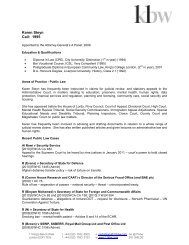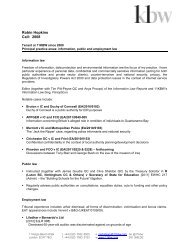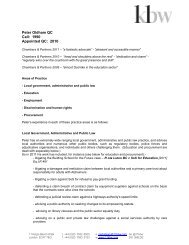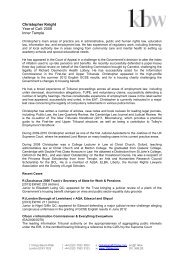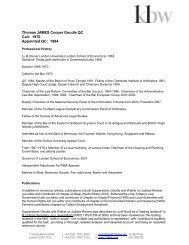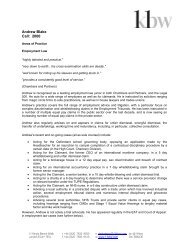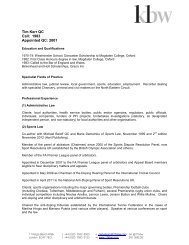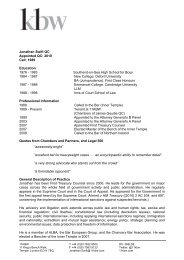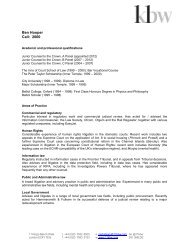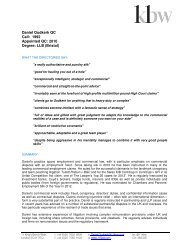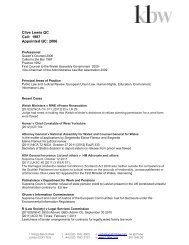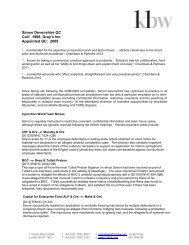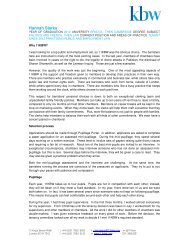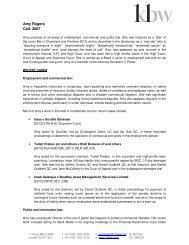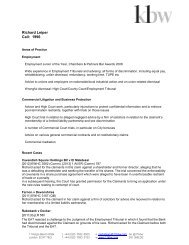THE PUBLIC SECTOR EQUALITY DUTY Joanne Clement - 11kbw
THE PUBLIC SECTOR EQUALITY DUTY Joanne Clement - 11kbw
THE PUBLIC SECTOR EQUALITY DUTY Joanne Clement - 11kbw
Create successful ePaper yourself
Turn your PDF publications into a flip-book with our unique Google optimized e-Paper software.
information as possible about any potential equalities issues (and if that information is<br />
not already available to the public authority, it may need to consult just to obtain that<br />
information). If a full and detailed EIA is then produced and considered before the<br />
decision under challenge is taken, that will be sufficient to discharge the duty.<br />
D. Challenges to Budgets<br />
19. Attempts have been made to challenge decisions to adopt the overall budget for<br />
central and local government on the basis that there was a failure to comply with the<br />
PSED. The Courts have been reluctant to entertain such challenges.<br />
(i) Challenge to central Government budget<br />
20. In R (Fawcett Society) v Chancellor of the Exchequer & others [2010] EWHC 3522<br />
(Admin) Ouseley J refused to grant the Fawcett Society permission to judicially<br />
review the Coalition Government’s 2010 Emergency Budget on the grounds that the<br />
Chancellor had failed to comply with s.76A of the Sex Discrimination Act 1975. The<br />
criticism was that the Chancellor had failed to carry out a gender EIA of the Budget<br />
when it was proposed.<br />
21. The first part of the challenge focussed on the whole Budget and the public spending<br />
envelope which set departmental spending limits. No EIA had been produced that<br />
evaluated the potential impact on gender in respect of the budget. The Court<br />
accepted that the provisions of section 76A of the Sex Discrimination Act were in<br />
principle broad enough to apply to government action such as the preparation and<br />
presentation of the Budget, including public expenditure limits. Such actions would<br />
now clearly fall within section 149 of the 2010 Act.<br />
22. The Government argued that it was appropriate and legitimate to decide that the<br />
impact of the provisions of the Budget on gender equality objectives should be dealt<br />
with by reference to the impact of the various specific individual items within the<br />
Budget rather than on an overall basis. The claimant argued that this approach was<br />
unlawful, because it would cause the cumulative effect of the Budget on equality of<br />
opportunity to be ignored. Ouseley J accepted the Government’s submission that the<br />
varied measures, differing in nature, introduced or flagged in the Budget made impact<br />
assessment of the Budget as a whole inappropriate:<br />
“...if the analysis of gender equality impacts can adequately be<br />
undertaken by consideration of the line items in the Budget, the<br />
duty is fulfilled or rather not breached by its being dealt with in<br />
that way at that stage. For my part, I cannot see any reason why<br />
<strong>Joanne</strong> <strong>Clement</strong>, 11KBW<br />
t. 020 7632 8500 e. <strong>Joanne</strong>.<strong>Clement</strong>@<strong>11kbw</strong>.com<br />
8



